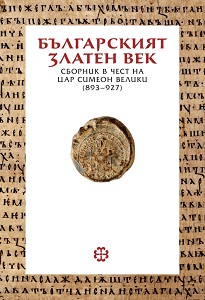

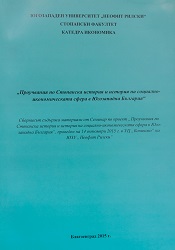
Keywords: voynuks; bashtina; households; registers
The legal status of the voynuk bashtina as a base of the agriculture activity of the voynuk households from the Central Balkans during the first two centuries of the Ottoman rule is made clear in the article on the basis of the Ottoman legislation from XVI century. New information about the structure and size of the agricultural parcels in the voynuk bashtinas is presented according to the data from some published and unpublished Ottoman registers. The regional characteristics of the voynuk landowning can be clearly seen, mostly in North West Thrace, Sofia and Kyustendil regions.
More...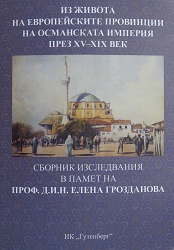
Keywords: population studies; population structure;
The paper presents new data on the total number of the voynuk population in Eastern Rumelia in the first half of the 16th century, based on an unpublished voynuk register from 1528/29, and two concise registers of the population in Rumelia from 1530. The registry data also allow to calculate the approximate percentage of voynuks, the population, exempted from avariz,and the ordinary reaya who were registered in the Bulgarian lands in 1528-11530. The paper also examines the changes from the early years of the region of Suleiman the Magnificent when service of voyunks in the sncaks of Valchitran, Kyustendil and the region of Epirus was abolished. The voyunks in the sancak of Valchitran were transformed into ordinary reaya, but those of the sancak of Kyustendil and the region of Epirus were recorded as taxpayers in the hases of Sultan and their organization was preserved.
More...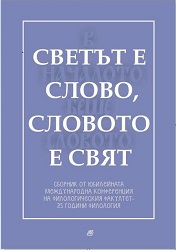
Keywords: cultural heritage; Kalinitsa; urban festival; St. Mary; Midsummer
The "Kalinitsa" festival is an example of the revival of a local tradition, which acquires new life by interpreting it as part of the cultural heritage of Assenovgrad. The "little Jerusalem" is the popular nickname of the town, reflecting a shared idea of centuries-old Orthodox culture, many churches, monasteries and chapels in the town and its surroundings. The project “Assenovgrad – the sacred gate of the Rhodopes” and the routes of pilgrimage tourism in “The Rhodope Holy Mountain” highlight these characteristics of the region. Integrated in the cultural calendar of the town, "Kalinitsa" is now a representative festival, utilized to become one of the tourist attractions. Except in print media, this event is promoted through the Facebook profile of the Tourist Information Centre at the Municipality. In the context of these policies of constructing cultural heritage and turning it into an attractive tourist product, the author presents a cultural practice and a revived tradition, surpassing the original legend. The aim of the study is to determine how "Kalinitsa" is reconstructed nowadays, what are the main functions and the importance that the local community attributes to it. The analysis identifies the main discourses associated with this holiday, paying attention to the role of collective and individual memory in shaping modern practices and models of celebration in the community. In the disclosure of all aspects of this tradition the author leans upon personal observations, stories of participants and earlier ethnographic studies.
More...
Keywords: Cyrillic alphabet; History; Balkan history; Antiquity; Bulgarian history; Cyril and Methodius;
The article follows the issue of the spiritual outlook of Europe in the context on the continental literary traditions, the role of the saintly brothers Cyril and Methodius and their disciples, of Prince Boris and Tsar Simeon, coming to the conclusion that, if we try to ask ourselves what is Europe today, what defines it most precisely is Graeco-Roman Antiquity, Christian culture and the three main alphabets - Latin, Greek and Cyrillic - by means of which our Old World has carried its heritage and memory through the centuries.
More...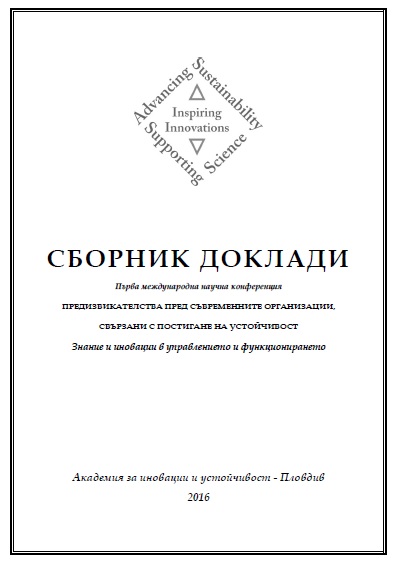
Keywords: conflict; management; analysis; control; conflict generation
The paper considers the opportunity any public process to develop and solve specific rivalries of influencing forces. It is thus imposed the term "conflict generation". Tracing its evolution shows not only how it has occurred, but how in various epochs its content changes. The purpose is through an appropriate analysis to create the mindset that any indication of a conflict can cause attention from management and activate the control function, interpreted as preventing the manifestations of deviant behavior of individuals or personality formations perceived generally as active social, economic and political subjects.
More...
Keywords: knowledge; skills; competences; teaching; learning; training
The paper presents development, modern challenges and recent trends in technological training on university level through the experience of the Faculty of mechanical and manufacturing engineering of Angel Kanchev Ruse University. Courses providing technical and technological knowledge and skills in higher education are analyzed from different points of view – teaching university students from specialized in the field of machines and technology faculties and department and those enrolled in specialties from other professional spheres needing basic competences in technology in correspondence to relevant subjects of study. The organization and the implementation of technological training is discussed as a two-fold process of teaching and learning oriented to competences’ acquirement according to social and business needs. Ways of overcoming the mismatch between provided and sought knowledge and skills on labor market are recommended focusing on synergy interactions between participating parties and good practices at universities considering policies and strategies in both national and European scope setting the development of education and training according to the adopted priorities of intelligent, sustainable and inclusive growth.
More...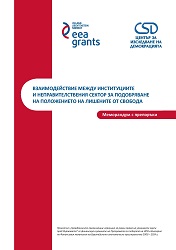
Keywords: CSD; Center for the Study of Democracy; memorandum; NGO; recommendations; vulnerable groups; persons deprived of their liberty; prisoners
The initiative ‘Civic Organizations: a Guarantee for Equal Rights of Vulnerable Groups before the State’ encompasses four vulnerable groups: persons deprived of their liberty, victims of human trafficking and domestic violence, as well as persons in need of international protection and other vulnerable foreigners. Although very different, those communities encounter similar problems in their relations with institutions: insufficient human and financial resourcing, work practices not always meeting the needs of vulnerable groups. Thus, oftentimes those persons rely on civil society for improving their status, including through assistance before the respective competent authorities. Throughout its different stages, the initiative outlined the profile of the vulnerable groups, their relations with institutions and NGOs and promising foreign experience and practices applicable in the Bulgarian environment. A Concept for More Effective Civic Participation in the Assistance to Vulnerable Groups was developed, proposing further practical steps. The four memoranda (Co-operation between institutions and NGOs in improving the status of domestic violence victims; Co-operation between institutions and NGOs in improving the status of victims of human trafficking; Co-operation between institutions and NGOs in improving the status of persons deprived of their liberty; Co-operation between institutions and NGOs in improving the status of persons seeking international protection and other vulnerable foreigners) contain specific recommendations to institutions, working with the vulnerable groups, based on the Concept and the opinions of various state authorities and civil society representatives.
More...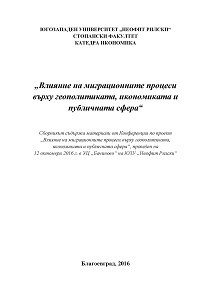
Keywords: Migration flows; Integration; Intercultural dialogue
Many countries around the world, which are traditionally the subject of immigration flows have gained experience in the area of integration and have extracted the most possible positive effects generated by immigration processes. They generally are in the sphere of economy, production, employment, culture, demography and others. It is very important that experience to be studied, because it represents added value that will146contribute to greater efficiency and speed in the implementation of various integration techniques and methods at national and local level.
More...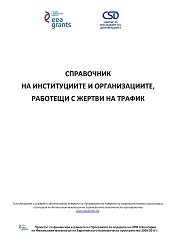
This directory of institutions and organizations, working with selected vulnerable groups – prisoners, refugees and migrants, victims of domestic violence and human trafficking – was made within the framework of the initiative Civic Organizations: a Guarantee for Equal Rights of Vulnerable Groups before the State. State authorities and NGOs are presented in separate templates, outlining their contact information, as well as their main activities, related to vulnerable groups. The legal grounds for institutions’ work with those communities are described, as well as the key projects NGOs have worked on in the areas under research in the last few years.
More...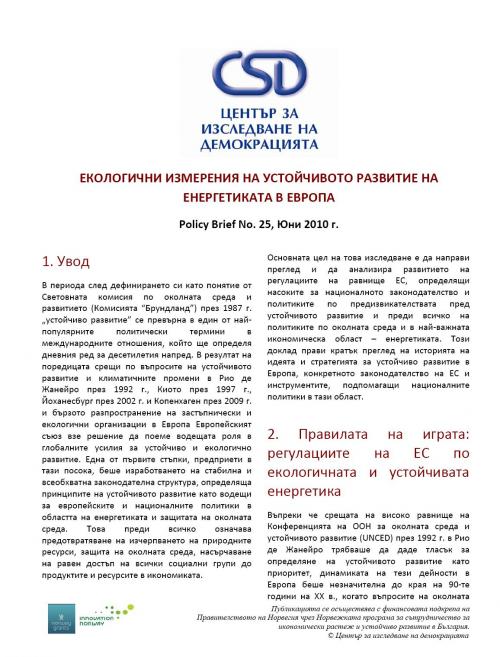
Main purpose of this study is to review and discuss the development of regulation at EU level to guide corresponding national legislation and policies designed to address the challenges of sustainable development, notably those on the environment dimension and as regards to the most relevant economic sector – energy. The paper will briefly examine the development of the idea and strategy for sustainable development in Europe over time, the concrete EU legislation and instruments to facilitate national policies to support such development.
More...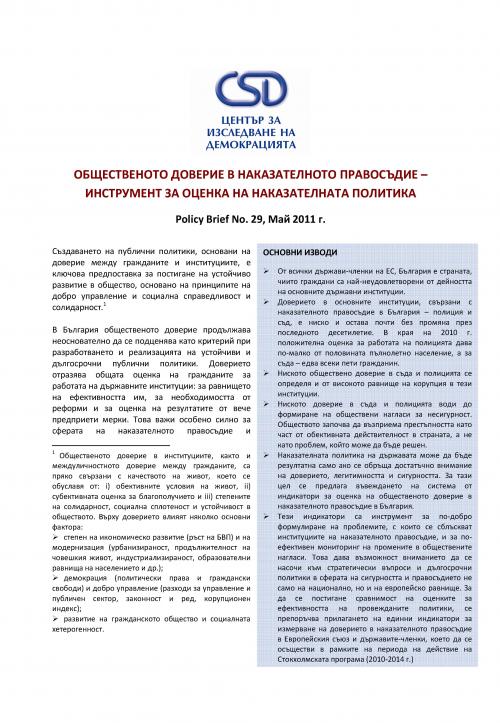
The policy brief presents the results of a survey of the public trust in the police and the courts in Bulgaria, the public perceptions of the level of corruption in these institutions and the fear of crime in the Bulgarian society. Of all the EU member states, Bulgaria is the country whose citizens are the least satisfied with the performance of the main government institutions. Trust in the main institutions concerned with criminal justice – the police and courts, is low and has remained practically unchanged over the last decade. At the end of 2010, a positive evaluation of police performance was given by less than half of the country’s adult population and barely one in five gave a favorable opinion of the courts. The low public trust in the courts and police can also be accounted for by the high level of corruption in these institutions. It is also conducive to public attitudes of insecurity and the society begins to perceive crime as an inherent part of reality rather than a problem that can actually be addressed. A state’s penal policy can only produce results if sufficient attention is paid to trust, legitimacy, and security. It is therefore recommended to adopt a system of indicators for the assessment of public trust in criminal justice.
More...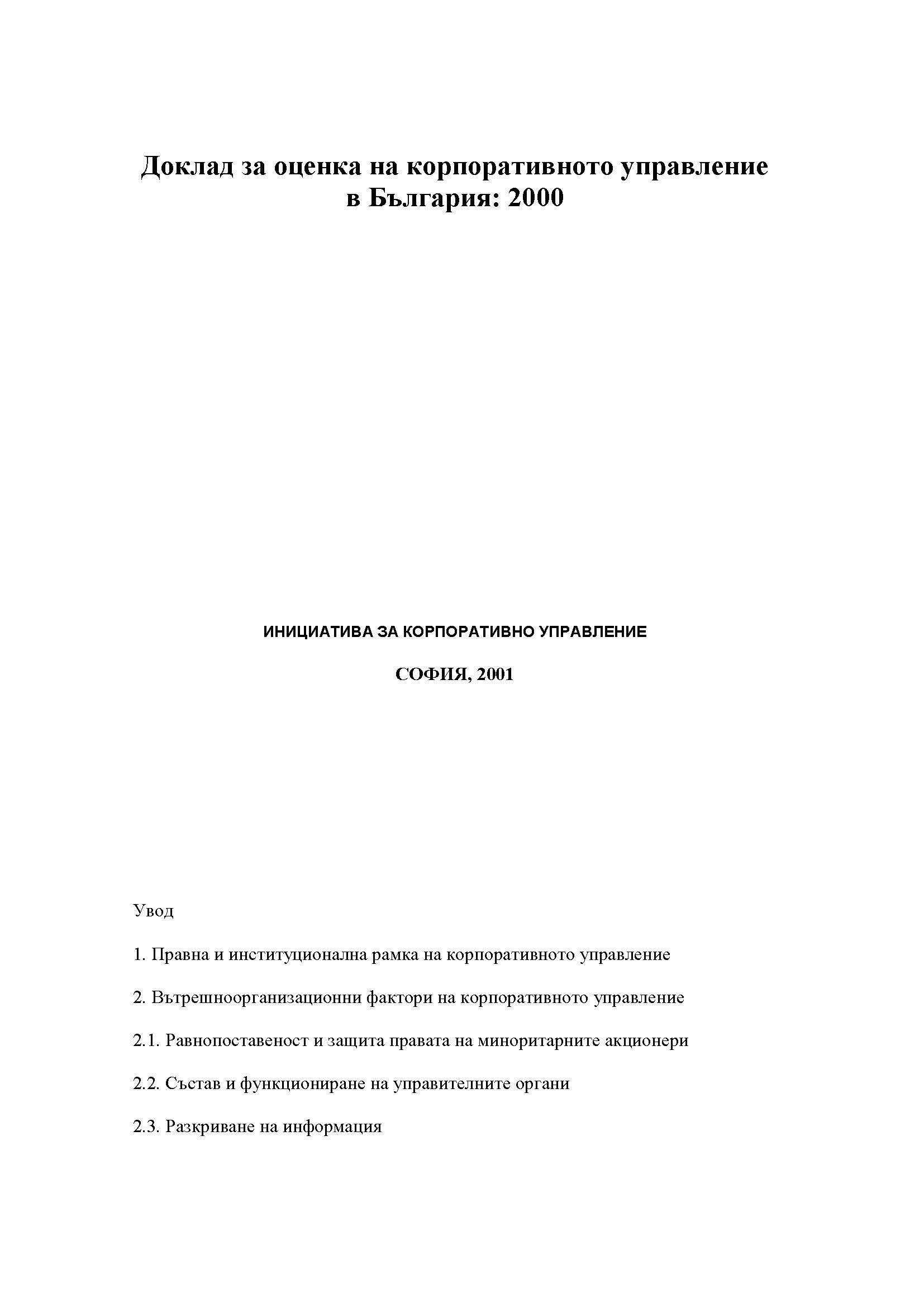
The present report has the objective to provide an overview of the general framework and particular dimensions of the corporate governance in Bulgaria. It is published for the first time and the authors intend to continue its publication on an annual basis. In its present form, the study contains information thus far unavailable to the professional community and the media. The evaluations and analyses herein are the first attempt to outline the achievements and the problems in the field of corporate governance in Bulgaria in the years of transition. The authors of the report thus aim to encourage a wider discussion on the subject and that, as a result, practical improvement action will be undertaken. At the end of the past year the Corporate Governance Initiative conducted a pilot study for assessment of the corporate governance in Bulgaria. It is a part of the activities under phase II of the project aiming at the elaboration of recommendations for practical measures for improvement of the corporate governance, including diagnostics and analysis of the existing corporate structures. The survey was conducted by Vitosha Research and covered all listed companies with authorized capital over BGN 200,000. The sample comprised 268 companies, while the number of the surveys was 158. The research method applied is a standard interview with representatives of the companies' managing bodies and senior management. Based on the survey results, the first index of corporate governance in Bulgaria was calculated. The index has values between 1 and 5, the lowest value of 1 indicating unfavorable legal and institutional frame and internal organizational factors of the corporate governance, and the highest value of 5 - ideal conditions and good practice of corporate governance. The report has been prepared mainly on the basis of the results of the pilot study, compared and partially supplemented by conclusions and assessments of other studies, publications in the press and international sources. The report has been prepared by the following team: prof. Dr. Bistra Boeva, associate prof. Dr. Stefan Petranov, Dr. Vesela Stancheva, senior research associate Plamen Chipev, Diana Hristosova - senior expert, Center for Economic Development, Stoyu Nedin - Chairman of Association of shareholders, Dr. Maria Prohaska - coordinator, Corporate Governance Initiative.
More...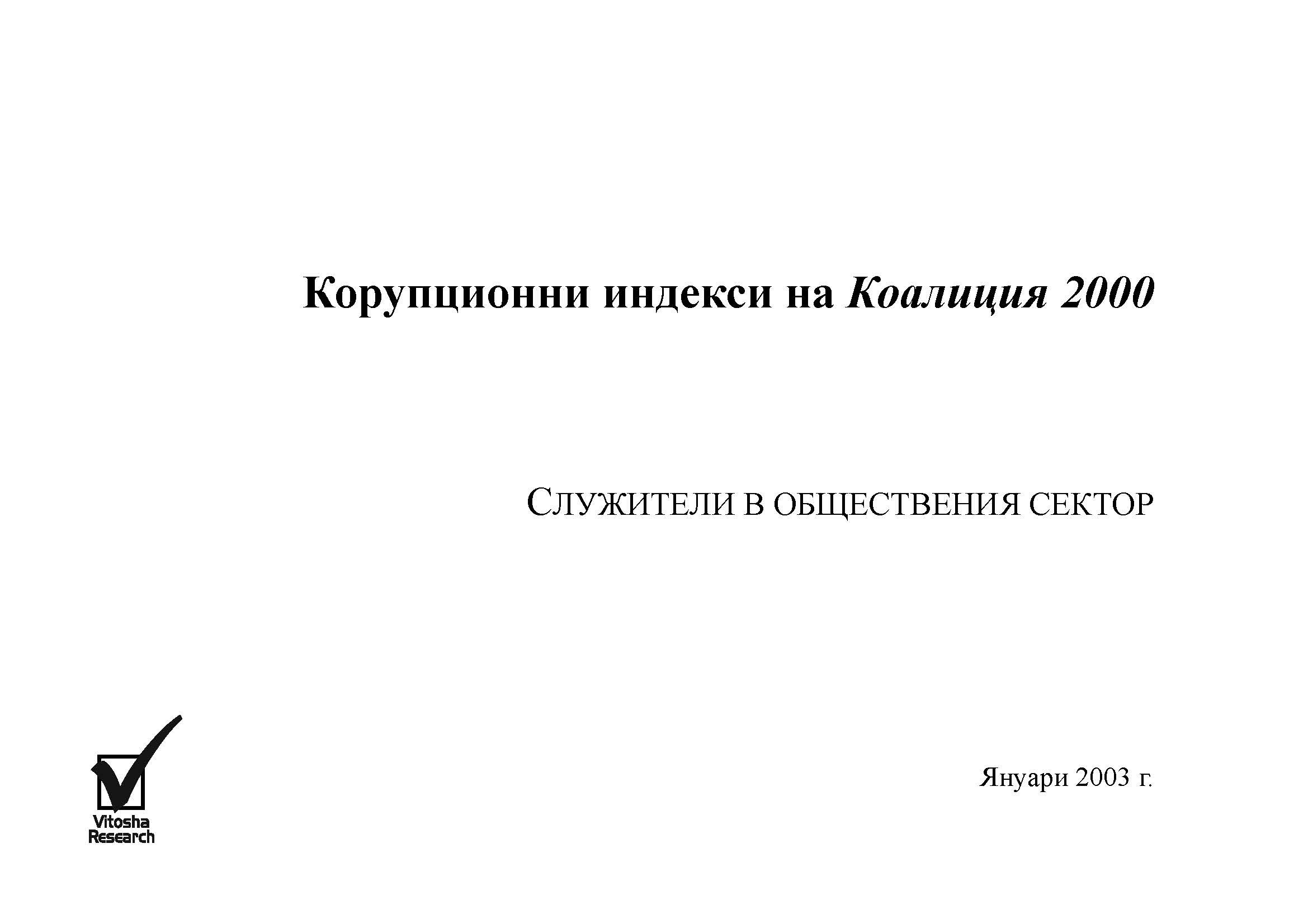
National survey of public officials, conducted in 1999 among 320 officials and in 2002 among 412 officials. The research method is face-to-face interview. During both monitored periods corruption is assessed by public officials as one of the five most important national problems. In its importance corruption is commensurate with the main socio-economic problems our society is facing.
More...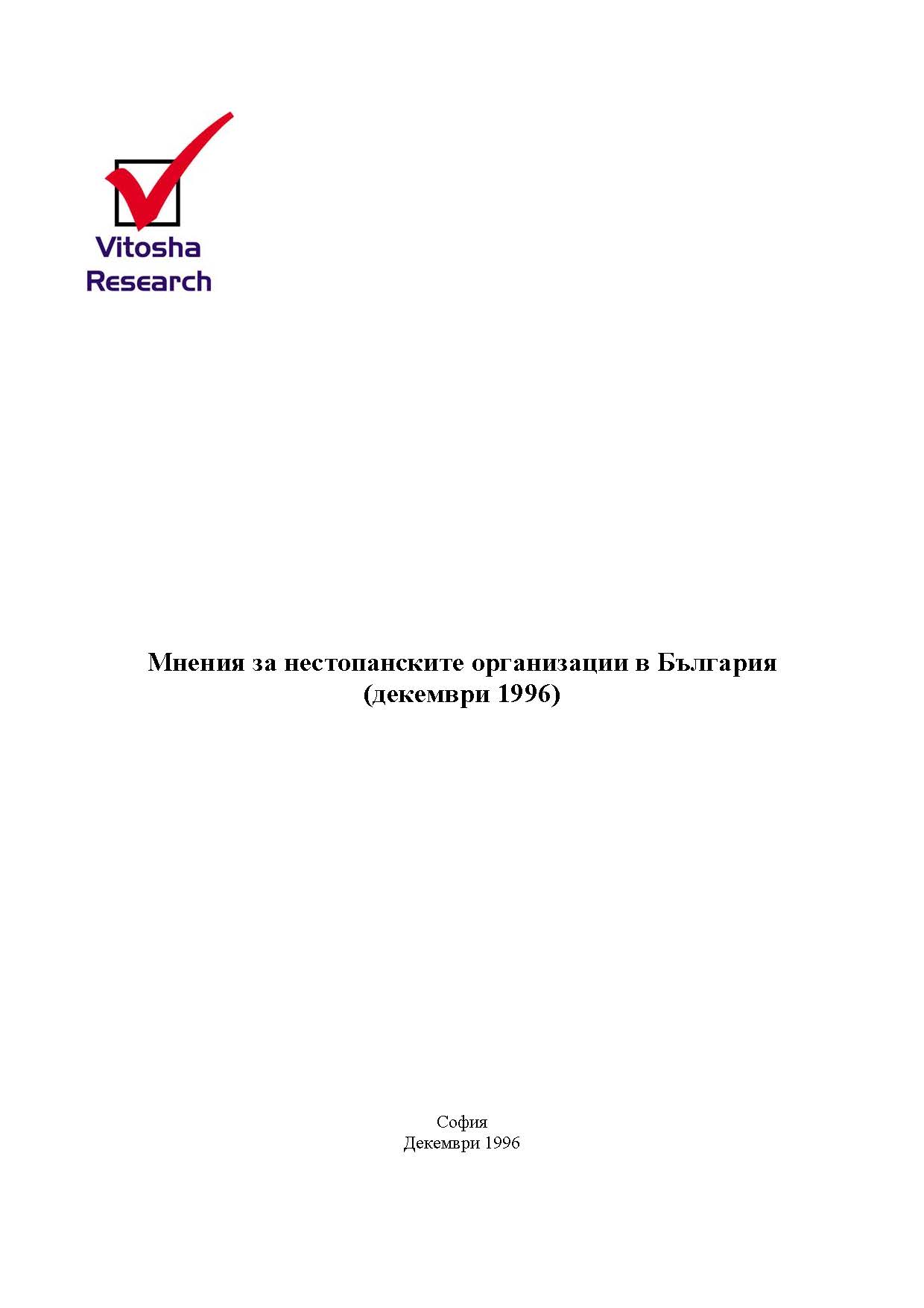
A representative national survey was conducted by Vitosha Research in the month of December 1996 with the aim of registering popular attitudes to NGOs in Bulgaria. It was conducted between 1-14 December, 1996 by the personal interview method with the participation of 1,561 respondents aged over 18. Two-stage cluster sampling was used. In the first stage 250 constituencies (clusters) were randomly selected from the list of constituencies in the last parliamentary elections of 1994, and the second stage consisted in randomly selecting 7 respondents out of each cluster. The sample included 176 clusters in towns and cities and 74 clusters in villages.
More...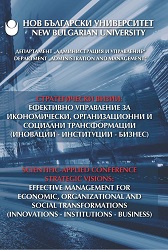
Keywords: innovation; tourism; hotel business; investment; technology; communications; education; сreativity;
The growing role of innovation in the tourism industry is the result of huge investment in technology, education, and creativity which are changing the hospitality business. The paper is focused on the challenges that sustainable tourism development is facing as a result of the emergence of new services and products that attract tourists by quality and innovation. It presents creative ideas and technology in the hotel and restaurant business and transportation which are changing the dynamics of international market competition and analyzes the results of commutations in innovation activity with impacts on company development, expert leadership potential and effective communications_ for tourism.
More...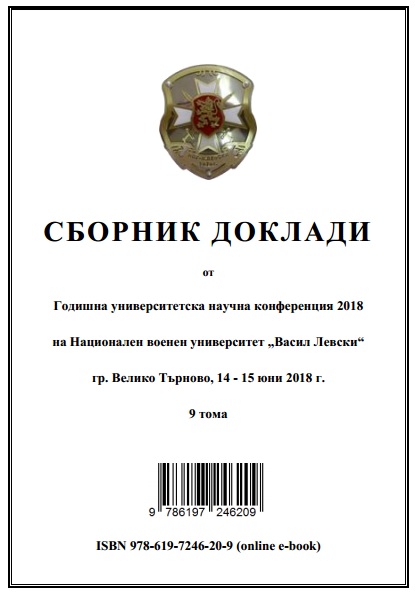
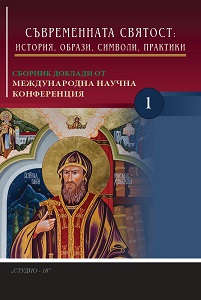
Keywords: Eucharistic holiness; Liturgical Theology; Symbol-Reality; Faith-Reason; Church tradition; Liturgical interpretation
The Liturgical and Eucharistic witnesses of holiness prove the basic principles of the Christian worship of the Christian as a creative process as a mystical act of fellowship between man and God and emphasized both the faith and the knowledge that the believers should gain. The main problems with regard to the Eucharistic holiness in this study are addressed in the following points: establishment of eternal holiness – foundation of the Eucharist, God's holiness - manifestation in symbol and reality, angelic holiness in liturgy, confession of belief in Eucharistic practice as a mandatory condition for consecration, „Εὐχαριστήσωμεν τῷ Κυρίῳ“, the Eucharistic sacrament as an expression of God's holiness in transformation and consecration, the sanctifying power reflected in Byzantine liturgies, knowing the truth as a way of sanctification in God, faith and reason - one in the understanding of God's holiness.
More...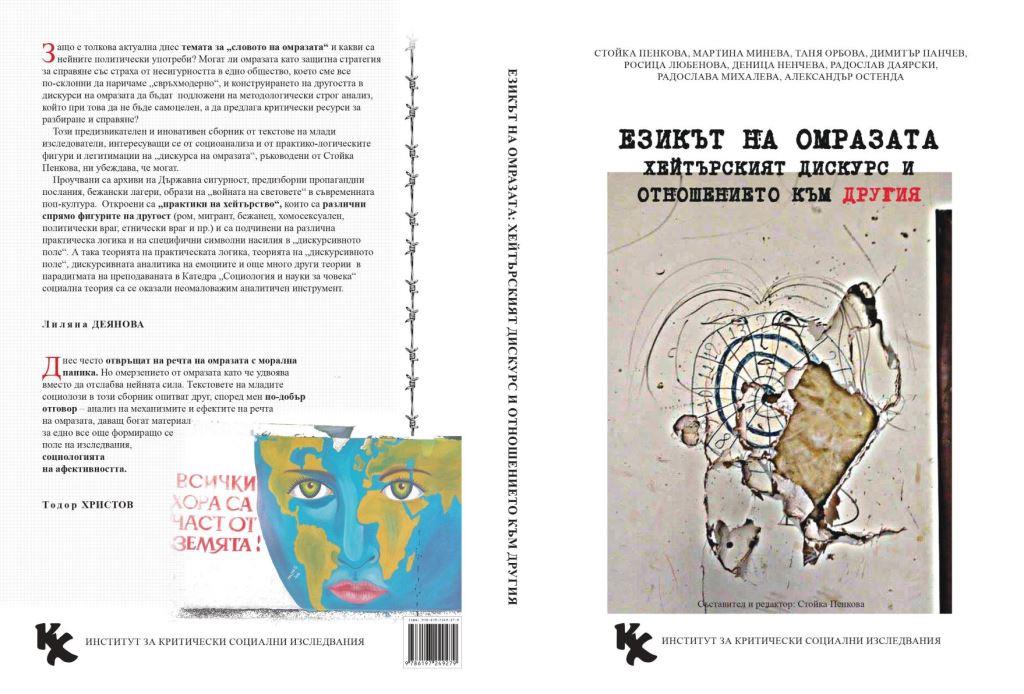
Keywords: social inequality; hate speech; discourse analysis
The study sets itself the ambitious task of thematizing hate speech as a social phenomenon, which in different ways entails social actions of “doing” hate speech, and hence - (re)produces unequally distributed relations of power and domination over the Other.
More...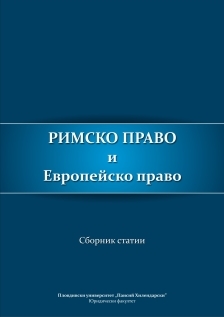
Keywords: Roman law; European law; EU frameworks
The necessity and the possibility of forming a unified European law, creating a European legal identity while preserving the specifics of individual national legal systems is justified by the unprecedented movement of people, goods and capital between countries in Europe. The article presents the role and place of Roman law as a model of uniform legislation inside or outside the institutional EU frameworks.
More...